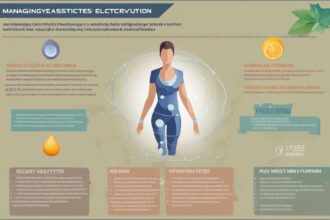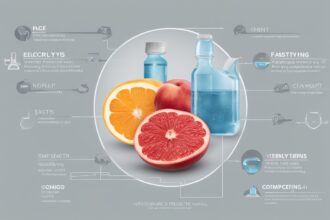Hey there, fasting enthusiasts! If you’ve ever embarked on a fasting journey—whether it’s intermittent fasting, a prolonged water fast, or something in between—you’ve likely heard about the importance of electrolytes for fasting. But what exactly are electrolytes, and why do they matter so much when you’re abstaining from food? In this comprehensive guide, we’re diving deep into the world of electrolytes during fasting, exploring their role in your body, how fasting impacts them, and actionable ways to keep your levels balanced. Whether you’re a newbie or a seasoned faster, understanding electrolytes fasting can make all the difference in feeling energized and avoiding those pesky side effects like fatigue or headaches. Let’s get started!
What Are Electrolytes and Why Do They Matter?
Electrolytes are minerals in your body that carry an electric charge, helping to regulate a variety of critical functions. Think of them as tiny powerhouses that keep your body running smoothly. The main electrolytes include sodium, potassium, magnesium, calcium, chloride, and bicarbonate. They’re essential for maintaining fluid balance, nerve signaling, muscle contractions, and even your heartbeat. When it comes to electrolytes fasting, these minerals become even more crucial because your body isn’t getting its usual intake from food. Without proper management, an imbalance can lead to symptoms like dizziness, cramps, or the dreaded “keto flu” if you’re combining fasting with a low-carb diet. So, keeping these levels in check is non-negotiable for a successful fast.
How Fasting Affects Electrolyte Balance
When you fast, your body undergoes significant changes, especially in how it manages water and minerals. Without food intake, insulin levels drop, prompting your kidneys to excrete more water and sodium. This process, often called “natriuresis,” can deplete your fasting electrolytes faster than usual. Additionally, if you’re doing a water fast or not supplementing properly during intermittent fasting, you might miss out on potassium and magnesium, leading to imbalances. Research shows that prolonged fasting can reduce electrolyte levels significantly, sometimes within just 24–48 hours. That’s why symptoms like fatigue, headaches, and irritability—often chalked up to hunger—might actually be signs of an electrolyte deficiency. Understanding this connection is key to mastering electrolytes while fasting.
Common Electrolyte Imbalances During Fasting
Let’s break down the most common electrolyte imbalances you might face during fasting and how they manifest. Sodium deficiency, for instance, can cause lightheadedness and nausea, especially if you’re sweating a lot or not replenishing with salt. Potassium imbalance might lead to muscle cramps or heart palpitations, while low magnesium can trigger fatigue and anxiety. These imbalances aren’t just uncomfortable—they can derail your fasting goals if left unchecked. The good news? By being proactive about electrolytes for fasting success, you can sidestep these issues. Pay attention to your body’s signals, and don’t hesitate to adjust your approach if something feels off.
Practical Tips to Maintain Electrolytes While Fasting
Now that we’ve covered the “why” behind electrolytes fasting balance, let’s talk about the “how.” Maintaining your electrolyte levels during a fast doesn’t have to be complicated. With a few simple strategies, you can keep your body happy and humming along. Here are some practical tips to get you started:
- Add Salt to Your Water: A pinch of high-quality sea salt or Himalayan pink salt in your water can replenish sodium levels. Aim for about 1/4 to 1/2 teaspoon per liter of water, but listen to your body.
- Consider Electrolyte Supplements: Look for sugar-free electrolyte powders or tablets that include sodium, potassium, and magnesium. These are especially handy during longer fasts.
- Drink Bone Broth (If Allowed): If your fasting protocol permits, sipping on bone broth during your fasting window is a fantastic way to get natural electrolytes and minerals.
- Stay Hydrated: Dehydration exacerbates electrolyte loss, so drink plenty of water—aim for at least 2–3 liters daily, depending on your activity level.
- Monitor Symptoms: Keep an eye out for signs of imbalance like headaches or cramps, and adjust your intake accordingly.
Foods and Drinks to Support Electrolytes During Eating Windows
If you’re practicing intermittent fasting or have eating windows, what you consume during those periods can set you up for success during your fast. Prioritizing foods and drinks rich in fasting-friendly electrolytes ensures your body has a solid foundation. Here are some top choices to include when you break your fast:
- Avocados: Packed with potassium and magnesium, avocados are a fasting-friendly superfood that also provides healthy fats.
- Leafy Greens: Spinach, kale, and Swiss chard are excellent sources of magnesium and calcium to support your electrolyte needs.
- Nuts and Seeds: Almonds, pumpkin seeds, and chia seeds offer magnesium and small amounts of other minerals.
- Coconut Water: A natural source of potassium and sodium, coconut water is a hydrating option—just watch for added sugars.
The Science Behind Electrolytes and Fasting Performance
Let’s geek out for a moment on the science of electrolytes during fasting. Studies suggest that maintaining proper electrolyte levels can enhance fasting benefits like autophagy (cellular repair) and ketosis (fat burning). For instance, sodium helps regulate blood volume and pressure, which can prevent the dizziness many fasters experience. Potassium supports nerve function and muscle recovery, critical if you’re active during a fast. Magnesium, meanwhile, plays a role in over 300 enzymatic reactions, including energy production—super important when your body is running on limited fuel. A 2019 study in the Journal of Clinical Medicine highlighted that electrolyte imbalances can hinder metabolic adaptations during fasting, underscoring why supplementation or mindful intake is so vital for optimal fasting electrolyte management.
In wrapping up, it’s clear that electrolytes for fasting are not just a buzzword—they’re a cornerstone of a safe and effective fasting practice. By understanding how fasting impacts your body’s mineral balance and taking proactive steps to replenish sodium, potassium, magnesium, and other key electrolytes, you can avoid common pitfalls and truly thrive during your fast. Remember to listen to your body, experiment with hydration strategies, and prioritize nutrient-dense foods during eating windows. Fasting is a powerful tool for health, and with the right approach to electrolytes while fasting, you’re setting yourself up for success. Have you noticed a difference in your fasting experience with electrolyte support? Drop your thoughts or tips below—I’d love to hear how you’re navigating this journey!






